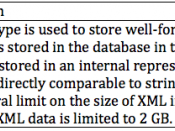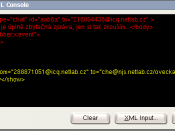XML stands for extensible markup language. This Language gives us the ability to write our own tags which function the way we want.
An insight study of XML reveals that XML could actually be used to handle heavy data like videos and other heavy media easily .XML parsers makes coding more reliable and quick by providing validation checks over what we have coded. The good structuring facility of XML allows us to generate documents easily. The ability of tight integration of XML helps in being more productive and also more reliable while coding. XML makes data access faster.
One of the most important advantages of XML is the ability to reduce the bandwidth.Businesses these days rely on the fast transfer of information to them . If the information revealed to them is slow and unreliable then the businesses wont be able to progress. XML is powerful to enable this.
"XXML is self-describing, i.e., its tags are meaningful.
"XXML is extensible in many ways: extensible tag library, extensible document
"XXML is distributable because its elements can be distributed entities in the web.
"XXML is user-friendly because it is human-readable.
"XXML is web-friendly because its components can be drawn for various sources in the web. For example, data came from one source, style sheet from second source, and DTD from a third source.
"XXML is very suitable for manipulation by the object-oriented language because each XML element is an object entity.
"XXML is modular in nature and allows flexible combination. For example, when a same basic XML data document is extended with different style sheets, different views are presented to the users.
The following could also be considered as the advantages of XML:
"XReduced Web Traffic
"XMore Efficient Web Search Functionality
"XMore Efficient Web Linking
"XMeaningful Data Standards
"XXML Web-enables the data that Web-enables the enterprise and brings with it the immediacy, universality and shared computing resources of the Web.
"XXML is a business tool for business users that flexibly supports business goals.
"XXML provides for the integration and collation of any data and information irrespective of storage environment or document type.
"XXML supports data mining and data analysis including consolidated reporting and new ways of viewing information.
"XXML enables data interchange and is platform and application independent.
"XXML reduces duplication of information production and processing, in turn reducing costs and enhancing quality control.
"XXML affords customization and personalization of information for greater user satisfaction.
"XXML enables content recycling and new product creation.
"XXML implementations need not impact current processes and systems.
The real power of XML comes from the fact that with XML, not only can you define your own set of tags, but the rules specified by those tags need not be limited to formatting rules. XML allows you to define all sorts of tags with all sorts of rules, such as tags representing business rules or tags representing data description or data relationships.


